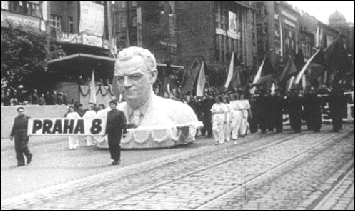|
|
|
Ŗ─ō┬üEŗr¢{üFāhāDāVāāāōüEānāiābāN
Director, Script : Dusan Hanćk |
1938öNÉČé▄éĻüBÆYŹBśJōŁÄęé╚éŪéīoé─üA1965öNé╔āvāēānĢ\ī╗ī|ÅpŖwē@ēfēµāeāīārĢö¢Õéæ▓ŗŲüA1964öNé╠ÆZĢęüwSix Questions for Jan Werichüxł╚ŚłŖ─ō┬üAŗr¢{ēŲéŲéĄé─Ŗłō«üB1969öNé╔é═Ź┼Åēé╠ÆĘĢęüw322üxéöŁĢ\üAā}āōānāCāĆŹæŹ█ēfēµŹšé┼āOāēāōāvāŖéŖlōŠéĄéĮüBł╚ŚłÆZĢęüAÆĘĢęŗżé╔ÉĖŚ═ōIé╔ÄĶŖ|é»éķé¬üAā`āFāRŹæōÓé┼é═é╗é╠ŹņĢié╠é┘éŲé±éŪé¬Ŗ«É¼éŲé┘é┌ō»Ä×é╔ÅŃēfŗųÄ~é╔é╚éķüB1980öNÉ╗Źņé╠üwI Love, You Loveüxé═1989öNé╠āxāŗāŖāōŹæ Ź█ēfēµŹšé┼Åēé▀é─ÅŃēfé│éĻüAŗŌīFÅ▄éŖlōŠéĄéĮüB¢{ēfēµŹšé┼é═1989öNé╔üwśVÉlé╠ÉóŖEüxüi1972öNüjé¬ÅĄæęŹņĢiéŲéĄé─ÅŃēfé│éĻüAé╗é╠īŃüAüwĢSöNé╠¢▓üxé╠ā^āCāgāŗé┼īĆÅĻī÷ŖJé│éĻéĮüBŗżÄYō}ÉŁīĀĢ÷ē¾īŃé═üAāXāŹāöā@āLāAéæŃĢ\éĘéķēfēµŹņēŲéŲéĄé─ŗ│Ģ┌éÓĵéĶüAīŃÉié╠łńɼé╔éÓō¢éĮé┴é─éóéķüB Born in 1938. Worked as a coal miner before graduating from the Film and Television Faculty of the School of Performing Arts of Prague in 1965. Works as both director and scriptwriter of his films beginning with the 1964 short Six Questions for Jan Werich. In 1969 his first long film 322 won the Grand Prix at the Manheim International Film Festival. Despite the dynamism of both his shorts and longer films, upon completion almost all have been banned from being shown in the Czech Republic. I Love, You Love made in 1980 was screened for the first time at the 1989 Berlin International Film Festival and won the Silver Bear. At YIDFF ' 89 Pictures of the Old World (1972) was screened as a special invitation film. As a representative filmmaker of Slovakia after the fall of communist rule, Hanćk now teaches and has become a mentor of the younger generation. |
 |
|
| é▒é╠ēfēµé═1945öNéµéĶ1989öNé▄é┼é╠ā`āFāRāXāŹāöā@āLāAé╠ŚÄjéé▄éŲé▀éĮŹņĢié┼éĀéķüB¢cæÕé╚ŗLś^ēfæ£éĢęÅWéĄéĮōÓŚeüAé▄éĮÉČæČÄęé╠ÅžīŠé╔é═1945öNł╚Ź~é╠é▒é╠Źæé╠ōÓÅŅéÆméńé╚é®é┴éĮŖŽŗqé╔éŲé┴é─ÉöüXé╠ÉVÄ¢Ä└é¬Æméńé│éĻéķé▒éŲé╔é╚éķüBéŠé¬āhāDāVāāāōüEānāiābāNŖ─ō┬é╠Äŗō_é═üAé│éńé╔é╗éĻéńé╠īāō«é╠Ä×æŃéÉČé½ö▓éóé─é½éĮÉlüXüAéµéĶī┬ÉlōIé╚ÉlŖįéŲéĄé─é╠æzéóüAŖ┤ɽé╠Ź▌éĶĢ¹é╔ī³é»éńéĻé─éóéķüBÄ®ŚRé╚öŁīŠé¬ōŠéńéĻéĖōŖŹ¢é│éĻéĮÉlüXüAŹĪüAÉ░éĻé─ł├ŹĢé╠Ä×æŃéīĻéķÉČæČÄęé═éĄé®éĄŖ∙é╔śVÉléŲé╚é┴é─éóéķüBŹ┼æüüAÄĖéĒéĻéĮÄ×é═ĵéĶ¢▀é╣é╚éóüBé╗éĻé═éĄé®éĄüAĵŹ▐ééĘéķānāiābāNŖ─ō┬é╔éŲé┴é─éÓō»éČé▒éŲé┼éĀé┴éĮüB1989öNō¢Ä×üAé▄éŠÄąē’ÄÕŗ`ÅöŹæé¬ēæ╠éĘéķæOé╔¢{ēfēµŹšé╔ÅoĢié│éĻéĮüwśVÉlé╠ÉóŖEüxüiüwĢSöNé╠¢▓üxüjé═śVÉléĮé┐é╠ÄĆÉČŖŽéōŲō┴é╚āAāCāŹājü[é┼æ©é”éĮŗLś^ēfēµé┼éĀé┴éĮé¬üAŹĪé╔éĄé─é▌éĻé╬éĀé╠ēfēµé═ŹņÄęé¬üwāyü[āpü[āwābāYüxé┼Ź×é▀éĮō¢Ä×é╠æ╠ɦéųé╠Ś”Æ╝é╚ößö╗éøUŗ╚é╔Ģ\ī╗éĄéĮüAé▄éĮé═é╣é┤éķéōŠé╚é®é┴éĮē╝¢╩īĆé┼é═é╚éóé®éŲéÓÄvéĒéĻé─éŁéķüBé╗é▒é╔ānāiābāNŖ─ō┬é╠ī|ÅpēŲéŲéĄé─é╠łĻ¢╩éī®éķÄvéóé¬éĘéķüBÄäé═éÓéżłĻōxüwśVÉlé╠ÉóŖEüxéī®Æ╝é│é╚é»éĻé╬é╚éńé╚éóüBüwāyü[āpü[āwābāYüxé═ŗLś^ēfæ£é┼Ä╩é│éĻéķŗ]ÉĄÄęüAÅžīŠÄęéŲō»Ä×æŃéÉČé½éĮŖ─ō┬é╠É[éóÉSé╠ÅØéī®éķÄvéóé╠éĘéķēfēµé┼éĀéķüB üiōnĢöÄ└üj |
Paper Heads is a film about the history of Czechoslovakia from 1945 to 1989.
Compiling a huge body of documentary footage together with the
testimonies of present day survivors, it reveals to us fresh facts
about the country's internal situation during that period. The
director Dusan Hanćk's approach is a sensitive one: drawing on
the personal remembrances of the individuals who lived through
the era's upheavals. These people, now already grown old, tell
stories of that dark period in which they experienced imprisonment
and were denied freedom of speech. Their lost time cannot be recovered,
and for Hanćk too it is the same. His film Pictures of the Old World, which was screened at Yamagata back in 1989 before the dissolution
of the Eastern Bloc, captured old people's views on life and death
with a unique sense of irony, but in retrospect, it now seems
it was an indirect expression of the frank criticism of the system,
as seen in Paper Heads, a documentary forced to be a masquerade. Thus, we glimpse a
new side to Hanćk the artist, and I find myself forced to reconsider
my previous interpretations of Pictures of the Old World. In Paper Heads, a director who himself lived through the same trying time as
the victims and witnesses inscribed in his film, shows us the
deep wounds in his heart. - Watabe Minoru |
|
|
|
|
Ŗ─ō┬é╠é▒éŲé╬ é▒é╠ēfēµé═ÉlīĀé╠µ°ńWé╔é┬éóé─é╠üAé╗éĄé─æSæ╠ÄÕŗ`æ╠ɦē║é╔é©é»éķÄs¢»éŲīĀŚ═éŲé╠ŖųéĒéĶé╔é┬éóé─é╠üAāGāéü[āVāćāiāŗé╚āRāēü[āWāģé┼éĀéķüBā\ārāGāgÆķŹæé═æµō±Ä¤ÉóŖEæÕÉĒé╠Æ╝īŃüAügÆnÅŃé╠ŖyēĆüh颱æ®éĄé─é╗é╠ÄxözéŖgæÕéĄéĮé¬üAé╗é╠Ä└æHé╔é©éóé─é═¢»ÄÕÄÕŗ`é╠éĀéńéõéķŚvæféÉ@éóŗÄéĶüAŗ░Ģ|éŲāfā}āSāMü[é╠ÉŁĢ{éō▒ō³éĄüAēĮÅ\¢£éÓé╠ÉlüXé╠¢Įéöjē¾éĄéĮé╠é┼éĀéķüB Ääé╠ēfēµé═éµéĶī÷É│é╚ÉóŖEé┼ÉČé½éĮéóéŲéóéżÉlüXé╠ŖĶéóéĢ`éóéĮéÓé╠é┼éĀéĶüAīłéĄé─ÆPé╚éķē▀ŗÄé╠ē±ī┌é┼é═é╚éóüBŗżÄYÄÕŗ`Äxözé═1989öNé╔Ģ÷ē¾éĄüAæĮéŁé╠ŹæüX鬏─éč¢»ÄÕÄÕŗ`éųé╠ō╣é¢═Ź§éĄé─éóéķüBé▒éĻé═¢ĄÅéé╔¢×é┐éĮŗĻō’é╠ē▀Æ÷é┼éĀéķüBÄäé®éńī®éĻé╬üAēõüXé═ē▀ŗÄéŲé╠É▄éĶŹćéóéé┬é»éķé▒éŲé¬é┼é½éĖüAēõüXé╠Ä└Ź█é╠ÉČŖłé═¢óéŠē▀ŗÄé╠¢╝ÄcéĶé¬éĮéŁé│é±ÉČé½ēäéčé─éóéķüBé▒é╠ēfēµé┼é═¢`ō¬éŲŹ┼īŃé╔üA1990öNé╠āüü[āfü[é┼üAŗżÄYÄÕŗ`Ä×æŃé╠ēēÆdé╔Ś¦é┴éĮügānāŖā{āeé╠¢╩ühüiāyü[āpü[āwābāYüjéöĒé┴éĮÉléĮé┐éī®é─Å╬éóÉ║ééĀé░éķāXāŹāöā@āLāAÄs¢»éĮé┐é╠Äpéī®éķüB é▒é╠ēfēµé═é╗éĻéé│éńé╔ō╦é½Éié▀éĮī`é┼üAŗżÄYÄÕŗ`Ä×æŃé®éńé╠āvāŹāpāKāōā_é╠ÄæŚ┐ēfæ£éŲüAæSæ╠ÄÕŗ`æ╠ɦé╠ŗ]ÉĄÄęéĮé┐Ä®Égé╠īĻéķÅžīŠé╠éQé┬é╠āīāöāFāŗéīŹ÷é│é╣éķüBé╗éĄé─Ź┼īŃé╔üAēõüXé═¢»ÄÕÄÕŗ`éųé╠ÉĒéóé¬é▄éŠÅIéĒé┴é─éóé╚éóé▒éŲéŖwéįé╠é┼éĀéķüB |
Director's Statement This film is an emotional collage about violations of human rights and about the relation between the power of a totalitarian system and its citizens. After the Second World War, The Soviet empire was extended into the countries of Central and Eastern Europe. It had promised " paradise on earth, " but in practice it wiped out all elements of democracy, introduced a government of terror and destroyed the lives of hundreds of thousands of people. My film is not just a review of the past: it depicts the desire of people to live in a fairer world. In 1989 the communist regime collapsed, and many nations are now once more looking for a way to democracy. This is a painful process full of contradictions. In my opinion, we have not yet managed to come to terms with our past, even though many signs of this past are still present in our everyday lives. At both the beginning and end of the film, we see Slovak citizens gathered at an event celebrating May Day 1990. They are laughing at people standing on a red platform wearing " paper heads. " On another two levels, archives of propaganda are intercut with subjective testimonies of victims of the totalitarian system. In the end, we learn that the struggle for democracy is not yet won. |
